Good drama push 05_Japanese drama "My Family Story"_The pursuit of self, reconciliation and farewell
//The screenwriters "Miyato Kankuro" and "Nagase Tomoya" collaborated again after 11 years since "Ikebukuro West Exit Park", "Tiger and Dragon", and "Narcised Detective", and it was also the last time Nagase left Johnny's Office. works. //
This is the farewell work of Tomoya Nagase . In fact, I don't know much about him. It seems that I have only watched "Son-in-law" and "My☆Boss My☆Hero". It is the first time to open this new drama after many years. To be honest, I am in The first episode fell into a light sadness, because when I saw him, I remembered Yuko Takeuchi who had a lovely smile in the son-in-law and has now left (sentimental).
As for the genius Miyato Kankuro , I just want to say that "Meteor Kizuna", "What About the Loose Generations" and "Quartet" are my loves.
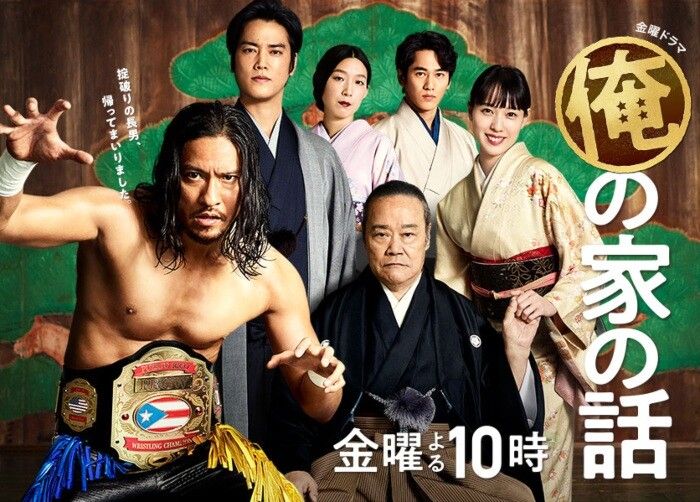
"The Story of My Family" (My Family's Words) ★★★★☆
(There are some plot descriptions below, but there are no mines. You will be reminded when spoilers are needed. Please take it with confidence.)
In the eyes of the eldest son, Kanyama Shouichi (Nagase Tomoya), the stern father Kanyama Shouzaburo (played by Nishida Toshiyuki), the leader of the Noh drama world and a stern father with the title of "National Treasure in the World", bears the heirs from childhood. Looking forward to but never getting a word of affirmation from his father, and there is a control group beside him - the late apprentice but talented artist Kanyama Shoujima (Kenta Kiritani), making him think he has no talent, and finally at the age of 17 When he escaped the world of "Noh", he stepped into the "wrestling world", gained recognition by his strength, and made a name for himself in the name of "Blizzard Shou".
Behind the seemingly evasive and rebellious behavior is actually a longing for his father's praise, because in my memory, only when watching wrestling shows, the unsmiling father will smile and become talkative. Wrestling is the only common language between father and son. Want to take a gamble on this.
After getting married and having children, Shouyi went overseas to develop. After an injury, he returned to China and got divorced. He was burdened with 20 million yen in alimony and a mortgage. The old injury and the growing age, the wrestling career has passed its peak and gradually declined. When it was not very good or even a little embarrassed, I received a notice that my father was critically ill.
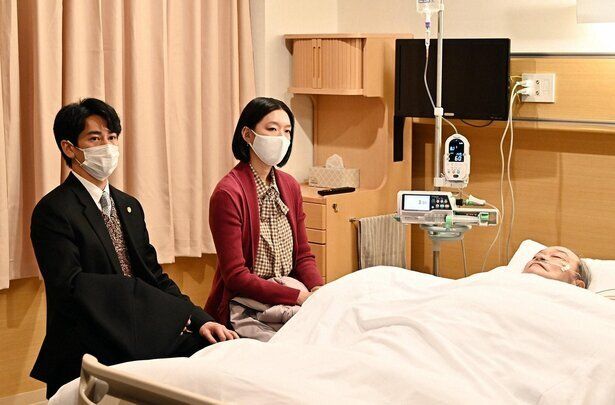
Younger brother Kanyama Yosuke (played by Nagato Ayanoyama) and younger sister Mai Nagata (played by Noriko Eguchi) watched their father fall on the stage and fell into a coma for three weeks as early as two years ago. After speaking, he went through a period of long-term illness, so he made psychological preparations for parting early and could talk about the distribution of property without changing his face.
However, Shouyi was unable to return to his senses for a long time. After all, he met again after a long absence, but he was next to the sick bed. Overnight, he faced the aging and fall of his majestic father standing like a majestic mountain. These shocks made it difficult for Shouyi to adjust for a while. Others felt the temperature difference, and even criticized the ruthlessness of the younger brother and sister, and felt extremely guilty for their years of indifference.
Shouyi returned to the hospital alone, told his father his thoughts over the years by the bedside, and made up his mind to leave the wrestling world and return to the world of Noh as the heir. .
After the retirement game, Shouyi picked up a pair of scissors and cut his symbolic long hair, but the next moment received news that his father was discharged from the hospital. Jusaburo suddenly miraculously returned from the gate of hell, but he dropped a shock bomb in front of his disciples: he had only about half a year left to live, and announced his engagement to the guardian Shida Sakura (played by Toda Erika).
When facing the accusations of my children, I responded by saying, " I have endured enough to live without drinking, prostitution, or gambling for many years. In the last year, I want to live as I want." In the end, the cruel words were left behind, and all the property after his death was inherited by Sakura, and he did not give a cent to the children.
When I saw this passage, I couldn't help but think of Onogawa Manju in "National Treasure" ( Youth Chapter ) ( Flower Arrangement ), who had a splendid kabuki career, but suddenly ran away from home in his later years and died in a cheap hotel, which sounds very down-to-earth It was miserable, but the drinking friends who drank and had fun with him recalled that Wan Ju once sighed that this small hotel was so good, "It 's good if it's small and dirty... There is nothing beautiful here, which makes people feel Very reassuring. I always feel that I can breathe a sigh of relief. It seems that someone finally told me not to hold on anymore. 』In the pursuit of the road, some people insist to go to the end, and some people choose to let go at the last mile. (There are really many places in the second volume of "National Treasure" that made my eyes red when I read it)
Most of the crouching people in the Japanese traditional entertainment industry started training from an early age and followed various norms and moral constraints, especially those who can obtain the title of national treasure on earth, probably will not be able to be relaxed and comfortable in their lives. (However, the Japanese drama did not discuss the process of Shouzaburo becoming a national treasure in the world. The image he gave me in his old age was that he lived a very free life, not much like Kikuo, who pursued the highest level of art and was rigorous and lonely in "National Treasure". Where it overlaps~)
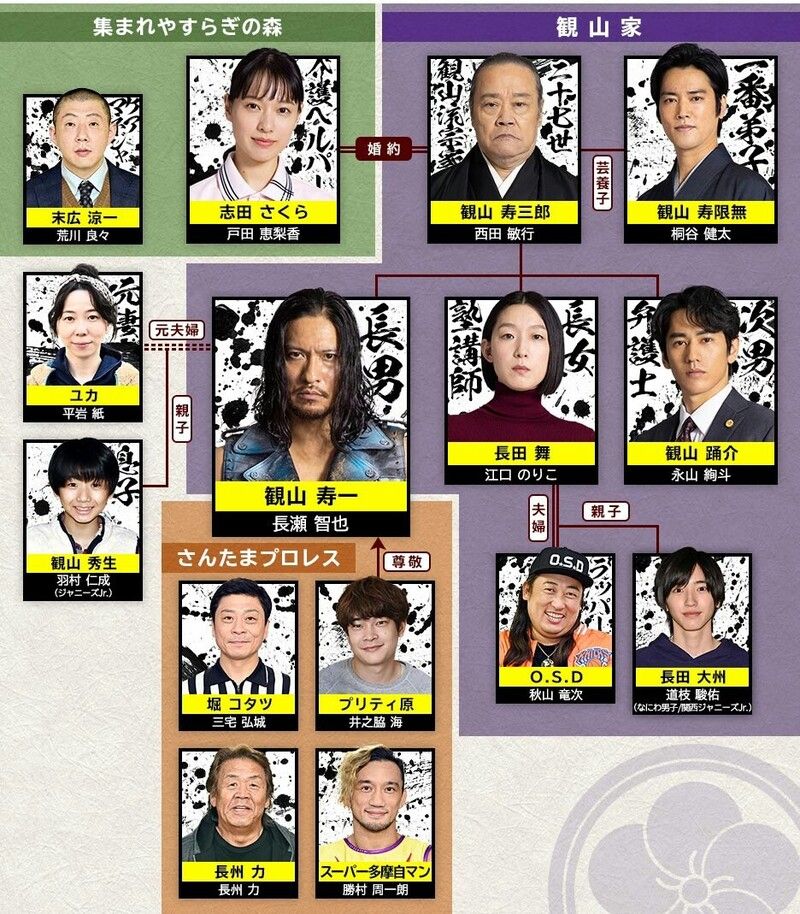
This is a family drama that describes the parent-child relationship, reflects the long-term care process of an aging society, and combines "wrestling" and traditional skills "Noh" to explore the path of life.
Although serious issues are packaged in a comedy way, I don't think it's a comedy, because most of the time I can't laugh at all, I just find it absurd but delicate.
Record a few episodes that you particularly like.
🚩What is a filial son? What is an unfilial son?
⏩ Siblings who reunited after a long absence due to their father's critical illness had an argument in the first episode.
"This is not the time to say nice things. You understand? If you're not cruel, you can't make it through life. Going to the nursing center twice a week may feel easy, but every morning you have to shake your feet. Dad moved to a wheelchair, do you understand how we feel?" (Yosuke)
"It's really heavy! The thought of this being our father makes me feel even more heavy..." (Dance)
"He is no longer a national treasure, just a heavy old man." (Yosuke)
In a few words, Chang Zhao's heartache was expressed, and the heavy burden was not only physical, but also psychological.
If you want me to say, it is actually inappropriate to describe it as "no filial son in front of the bed for a long time". It can be seen from many details in the play that even if the child is super scumbag who can be called a bastard (sorry, I just think this guy Shouzaburo is a downright selfish ghost, he really lives too ego and is not old to be annoying if Being abandoned by children at old age is actually just a good thing.) Fathers have many resentments and conflicts with each other, but they can’t let go of the fetters of family affection. Feeling guilt or self-loathing for selfish thoughts and words, but relieved,”—a kind of inner entanglement that I might not have understood ten years earlier, but I see it now.
After watching the whole drama, I don't think any character is "unfilial", and I don't even agree with the idea that one must be filial as a child. Filial piety is not an obligation, and if it is not an emotional reward from the heart, it is just another kind of moral blackmail. After Wu shouted the line "Taking care of your elderly parents is also a part of your life" to Dazhou, her face was complicated and regretful; there was also Shouyi's inner struggle and self-blame before and after sending his father to the nursing home. I am impressed.
Faced with the issue of retirement, the mentality adjustment of both parents and children is really one of the most difficult issues in life...
🚩How do we accept the gradual aging and loss of our original abilities of ourselves or our loved ones?
⏩ Sakura mentioned that Shouichi was responsible for helping his father take a bath and OMT (diaper changing), and Shouzaburo took it with rap to cover up each other's embarrassment. When taking a bath for the first time, Shou Yi was clumsy and could not do well. He hesitated when he squatted down to wash his feet, and whispered in tears:
"Why me? Why can't you even take a shower by yourself?"
"You're too useless. Why can't you, a son, do what an outsider like me can do?" Sakura responded angrily.
"I can't do it because I'm his son. Damn!"
(This reminds me of the scene in the movie "The Chancellor," where Robert Downey Jr.'s son cleans up for his incontinent father.)
I have an old man in my 90s. The process of watching the show is really full of sense of sight. In contrast, Shou Saburo is a cute little angel at all. The reality is far, far, far, far, far, far, far, far more cruel than in the play.
⏩ Later, when my father took a cognitive impairment test, when he was asked to name various vegetables, he was unable to answer. The helplessness, unease and wavering on the faces of himself and his children showed the hardships ahead.
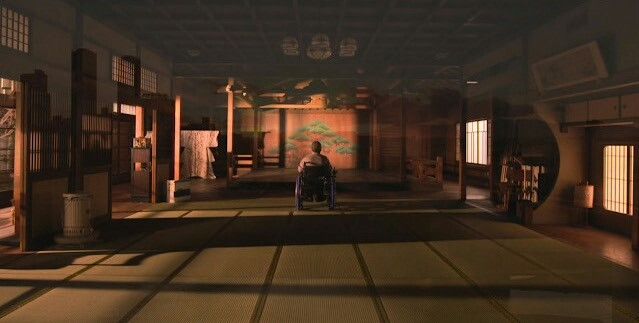
That atmosphere, that movement of the camera, and the scene where Suzaburo sits in a wheelchair alone and whispers to the stage behind him, it's so well done! I can't help but sigh, the light under other people's lenses is always good-natured, and when it enters my frame, it instantly becomes dumb!
⏩ During a walk, Jusaburo confided to Sakura.
"I don't know how to face death. I have lived a very casual, self-conscious and self-willed life in my life, so every night when I lie down in bed, I can't help but sigh that I have lived a very happy life, always holding that my life is over and I have no regrets. I fell asleep. But 2 or 3 hours later, I woke up again with a burst of self-loathing... I shook the cloth towel, but I don't know how to fold it back. Simply put, I don't want to die."
Once a highly regarded national treasure in the world, but reduced to the mentality of an elderly person who needs someone to take care of him, and as a father who wants to maintain his self-esteem, wants to return to the stage but has to compromise with his aging body, and faces his past mistakes and don't know how to end Feeling remorse, Nishida Toshiyuki played the various entanglements in the character of Shou Saburo to the core.
🚩Dreams, hobbies, talents and careers in life, how to take and how to give up?
Several key characters of this show have different moods on the road of Noh drama: Shouichi, who has talent in Noh drama and is qualified to inherit, but is more enthusiastic about wrestling, has talent in Noh drama and is devoted to it, but it is not a problem. There is no life span who is related by blood and gives up everything. The talented but unable to perform because of the daughter. The dance can only be placed on the son. The dance is very serious but has no talent. Dashu, who continues to play Noh, has a learning disability and ADHD, but shows great interest and determination in Noh.
It's interesting to watch people's thoughts and choices in the show from an outsider's point of view.
Does it have to be painful to give up your dreams?
Changzhou asked Shouyi in the ring: "A Shou, do you like wrestling?"
"My favorite." Shouyi replied without hesitation.
"Then you might be luckier than them, because you don't have to take your favorite thing as a job."
( Breaking it, this Changzhou in the play is performed by the Japanese wrestling superstar himself. The two who appear in the back are also like gangsters. )
Is it shameful to run away?
Seeing Dazhou hesitating between hip-hop and Noh drama, Shouichi sighed and said to Shoujianwu. Looking at Dazhou, he seemed to be looking at his past self.
Shou Xian Wu replied: "Running is also a kind of talent. I don't have that kind of talent and courage, so I can only work hard. But I think it is also the responsibility of adults to help children to escape."
If you don't like it, can't you do it?
Shouyi took Dazhou to the OSD store to eat ramen, and wanted to chat with him about his inner thoughts. He casually asked three or two sentences about OSD, who is inseparable from rap, why he opened a ramen shop instead of going on the road of a rapper, but got an unexpected answer:
"I don't like ramen. People who like ramen only understand the feelings of people who like ramen, so my opinion is also very important."
Although I am talking about the choice of work and dreams, I can't help but wonder if Miyato Kankuro is also implying that the world of traditional Japanese craftsmanship is mostly hereditary, which has been too closed and conservative for a long time. I am full of love for performances, but too insistent and limited will only narrow the road. Only by advancing with the times, accepting a wide range of rivers, and understanding the thoughts of people outside the circle can we have the opportunity to expand the circle and go further.
Of course, this is my own interpretation, because the financial difficulties faced by traditional performing arts families are described in the play (there is also ink in "National Treasure"), and in reality, due to the impact of the epidemic in 2020, Noh dramas face unprecedented challenges , forcing it to make some compromises and changes (such as opening online drama watching, etc.) ─ Sometimes you have to make compromises in order to survive, but you cannot lose the original core value, sometimes it depends on how some industries are between persistence and change. Striking a balance is also an interesting observation.
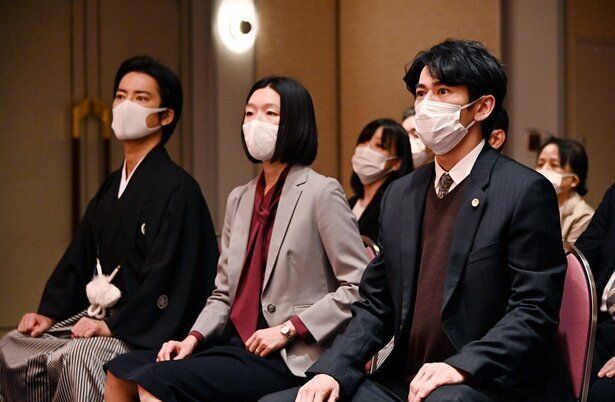
Speaking of the epidemic, the picture of everyone wearing a mask in this play is really the most special scenery in 2021.
⏩ Appreciation of Noh Drama
For me personally, Noh is one of the highlights of this Japanese drama.
Noh can be said to be a minimalist stage play, which is very boring for people who don't understand (especially foreigners), walking for five seconds normally can take dozens of minutes on the stage (see Section 5 At the beginning of the episode, it was mentioned that in some dramas, it takes half an hour to perform just "one step on the foot"), and the words sung are obscure and incomprehensible. Compared with the lively, interesting, enthusiastic and joyful world of animation, the world of traditional arts can be said to be It's boring and extremely hypnotic, and I didn't even have the slightest interest in it when I was in college.
Years is a highly skilled sculptor, carving and grinding my heart, making me gradually willing to calm down and appreciate these traditional skills. "National Treasure" immersed me in the world of kabuki, and "Story of My Family" made me interested in Noh drama, although those introverted realms are still difficult to understand, and what is being sung is often heard as foggy, but the drama itself The stories and connotations of the film are interesting, and I am fascinated by the actors who have lived and devoted their lives to art. (The focus of "My Family Story" is not on this.)
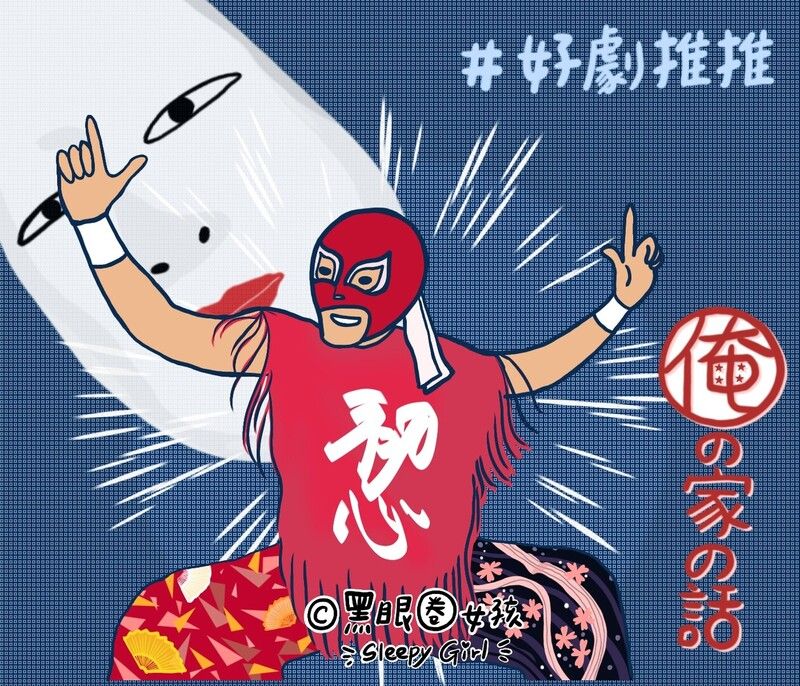
The play combines two elements of wrestling and Noh, whose performance styles and forms are quite different. One is full of kinetic energy and exaggeration, noisy and cheerful, and the other is restrained and calm, leisurely and distant. They have one thing in common: masks . Shouyi uses the mask to cover, and switches between two roles, one is responsibility, and the other is enthusiasm.
A very impressive scene is when Youhua and Sakura talk about Shouichi in each other's eyes.
"He doesn't have an ego. It's the same with 'Noh', although I don't understand it very well, but the mask has no expression. Whether it looks happy or sad depends on the mood of the audience. He is the same as the Noh mask, without Self." (Youhua)
"Are you saying he's hollow? 』
"It's not empty, it should be said to be transparent. He will give what I want, but I want to give it to him, but he will not accept it."
"Like a fairy. 』
"Fairy, you speak so well, you are a fairy. Although you are by your side, you can't touch it."
The moment he puts on the Noh mask, he plays the role of the play, hidden under the expressionless wooden mask, Shouichi has no own, and only lives for others. In contrast, under the cloth wrestling mask that undulates with the movement of the facial muscles, his expression is more flexible, and his enthusiasm for wrestling overflows from it.
Youhua and Sakura's interpretation of Shouichi is quite appropriate - of course, the connection between the goblin and Shouichi's big man is a little funny - the difference between the two is that as a fan, Youhua's eyes are full of Shouichi's dazzling and dazzling eyes. On the one hand, after getting married, she couldn't get into Shouichi's heart (the part where she confessed the reason for the divorce, the former Japanese consultant came to my mind, this is another story); Sakura saw Shouichi first Poverty and despair are the tired side of Changzhao.
For Youhua and Sakura, Shouyi is a spectacular sky tree. Youhua realizes that the existence of this tree is too huge and suitable for viewing from a distance. When you stay by your side, you can only keep looking up until your neck is sore and tortured by murderous aura . Instead, he chose to approach and climb up step by step until he could enjoy the same scenery.
(Ok, spoilers coming soon!)
(Those who haven't watched the show are advised to scroll down and read the epilogue below the next stills!)
↓↓↓↓↓Spoiler notice↓↓↓↓↓
The key Noh drama "Sumida River" staged in the play is roughly the following story:
A woman in a trance appears at the bow of a ferry on the Sumida River, frantically asking about her son's whereabouts, because her child was kidnapped by human traffickers a year ago. At the sound of pleading, the boatman agreed to let her on board and go to the other side to find her. Before the boat docked, the boatman looked at the crowd gathered under the willow trees on the far bank, and in the sound of chanting sutras, he recounted a sad past: last year, a human trafficker once dropped a human smuggler here. Even though the boatman and residents took good care of the ill young man, he still could not recover. The child said his name and background before he died, hoping to plant a willow tree beside his grave after his death. Now that one year has passed, a memorial service will be held for him. When the woman asked for details, she learned that the child in the boatman's mouth was actually her own son. The grief-stricken woman came to the grave to mourn and cry, and after being comforted, she began to recite the Buddha with the congregation for the transition of the child. During the chanting, the voice of the child echoed, and the son's undead appeared to meet the mother. The woman stretched out her hands to hug the child, but the dead soul disappeared with the dawn, leaving only the willow tree swaying in the wind.
Jusaburo sighed after talking about the allusions of this story: "The mother fell into insanity after searching for the missing child. There are many plays like this, but the only one where the son died is "Sumida River"."
"Am I going to die?" asked Hideo, who was about to play the role of the child in the play.
"He died from the beginning." Jusaburo responded with a smile.
↓↓↓↓↓High energy spoilers↓↓↓↓↓
Shou Saburo and Shou Yi later discussed whether the son's dead soul in the play should appear on the stage. Shou Yi believed that the audience would not understand if the dead soul did not appear, but another point of view believed that the actor's acting skills should be used to make the dead appear in front of the audience.
Shouyi said this: " If I were that son, I would show up. Because I want to meet, even if I don't show up, I still show up. "
I can't help but admire how powerful Miyato Kankuro is.
Why is it great?
Because every Noh drama combined in the play has its meaning. And as the Noh drama "Sumida River" implies, the son of Shouichi died, fell, and died.
Yes, starting from the first episode, Shouyi's voice is used as a narration to tell "the story of my family". He looks on in the way of "disengagement", describing himself as the eldest son + eldest brother + father + husband + Lovers with multiple identities, inner love-hate entanglement and responsibilities, take the audience to watch how the family takes care of their aging father, how to regain the connection between siblings, how to make up for the rift between each other, and how to prepare for parting … Shouyi made all the arrangements for his father's funeral. Everyone was waiting for Shou Saburo to return to the west with a crane, but the plot took a sharp turn. Shou Yi, who was in his prime, died one step earlier than the old Shou Saburo, and the result became He made up his own affairs.
Although it is very sad, I like this arrangement very much. As I often say, the world is impermanent, and death often comes unexpectedly. It has nothing to do with age. We can never predict when the people around us will leave and whether we will have a chance to say goodbye.
This Japanese drama is really like Chaplin's famous saying, life is a tragedy when viewed close up, but a comedy when viewed from a distance .
Shou Saburo has slowly accepted the fact that he is about to die. Facing the sudden blow of the white-haired man sending the black-haired man, he is unbearable. Like a madwoman in Noh drama, he falls into insanity and always speaks to the air. No, I watched the last episode again later, Shouyi's narration was " Both my father and I can't accept this fact", so after Shouyi died, he was still wandering in the world. Shouichi's dead soul speaks.
Shou Saburo is actually a very typical introverted caring, his father's love is hidden in the details.
He set his son's battle posture as a mobile phone screen wallpaper, and collected magazines interviewing his son; criticized him for his incompetence in front of his son, but confidently asserted in front of his disciples that he could make up for the 25-year gap in just one week. , it can be seen that he has confidence in Shouyi and recognizes his talent.
He can easily praise his grandson, but he is stingy with his son. Because he knows that all Shouyi's efforts are to get his own approval, and he is afraid that after giving those things (compliments or inheritance), the son will no longer need him - although it is not incomprehensible, I still feel that no matter what he does Husbands and fathers have failed miserably.
In the Noh drama at the end of the play, Shouzaburo confided to Shouichi who appeared beside the stage, and finally let Shouichi leave.
As a digression, Shouzaburō has cognitive impairment, that is, dementia. He may forget this "letting go" in the next minute. So, until he dies, will he repeatedly face this kind of "thinking that his son is a son"? Are you still in the cycle of" or "discovering that your son is dead", and you can't get out of the pain of losing your son? (Unless he completely forgets that he has such a son) Thinking of this, I feel that this "partially forgotten" dementia is really God's cruelest disease to mankind.
After being certified by his father as "a treasure in the world", Shouichi's ghost returned to the wrestling ring instead of the Noh stage. He took off the burden of "living for others" on his shoulders - performing to satisfy the audience, to cater to the audience. The father chooses to inherit the family business as expected, to fulfill the responsibility of the eldest son and to make up for the guilt of the family due to escape, to take up the care work, to make money to pay the alimony - finally saying goodbye to himself and the world with the wrestling he loves Finally, with the mask that fell on the ring, he officially left the stage of life.
Shouyi's death came too quickly, and the family didn't even have time to grieve and cry. As an audience member, I couldn't keep up with my emotions. Until later, the three of them were in the living room, Mai, Yosuke, and Shoujianwu. The moment before the dance, they laughed and said that they seemed to have missed the opportunity to cry for the death of the elder brother. Made me cry in seconds.
Epilogue
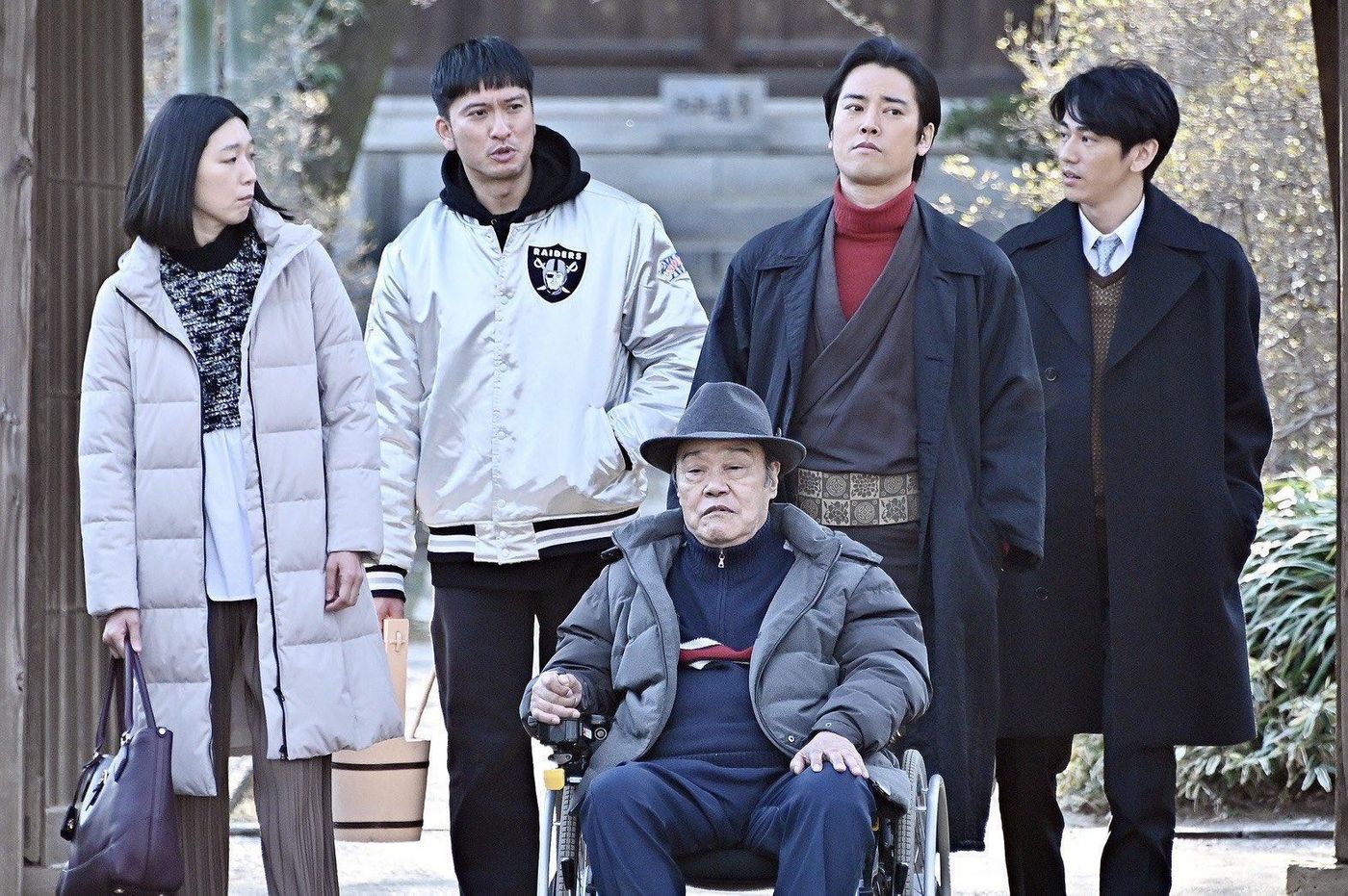
Most of the spotlight in the whole drama is on Shou Yi, but in fact every character is quite cute and lovable. And I especially like Mai Shoukai Wuhe, and the role of Osuke becomes more and more funny as I watch it, and Sakura is also a very good character (this is a compliment). Although this is a family drama, it doesn't have the sticky feeling of unconditional family love and sacrifice - Shouichi is a little bit, because he is a fairy (laughs).
I like the rebellious period of life without the late arrival, and I also like that the reason for his return after leaving is not because of his family, but because he has been engrossed in Noh drama since he was a child. This sense of reality that there are other ways to go. I like the role of Wu more. Although there is little ink on her overall, almost every scene attracts my attention. Love her outspokenness, in the scene where Shou Saburo was dying and everyone gathered around the bed to shout, I couldn't even laugh or cry, but Mai rushed forward and shouted to Shou Saburo, "Dad. , you may be thinking about going to heaven to meet Mom and apologize to her, but you think so beautifully, because you will go to hell !" I couldn't help laughing and wanted to give her a hundred likes (sorry for my cold blood ) .
The reason why I didn't give this drama 5 stars is because my personal experience of watching the movie is: there are many small details in the drama that amaze me, and the combination with Noh drama is very ingenious, giving me a perspective of appreciating Japanese culture. But, on the whole, the comedy (Miyato Kankuro's comedy has a special harmony and rhythm, some love it, some don't feel it) and the warmth is a little lacking (but it depends on the individual, and my ability to feel it seems to be a bit broken recently. ).
Also, the arrangement of Sakura marrying XX in the end, although the two of them are quite compatible, but this turning point came too fast, I couldn't get through it in my heart. (Munk-style shouting)
Like my work? Don't forget to support and clap, let me know that you are with me on the road of creation. Keep this enthusiasm together!

- Author
- More